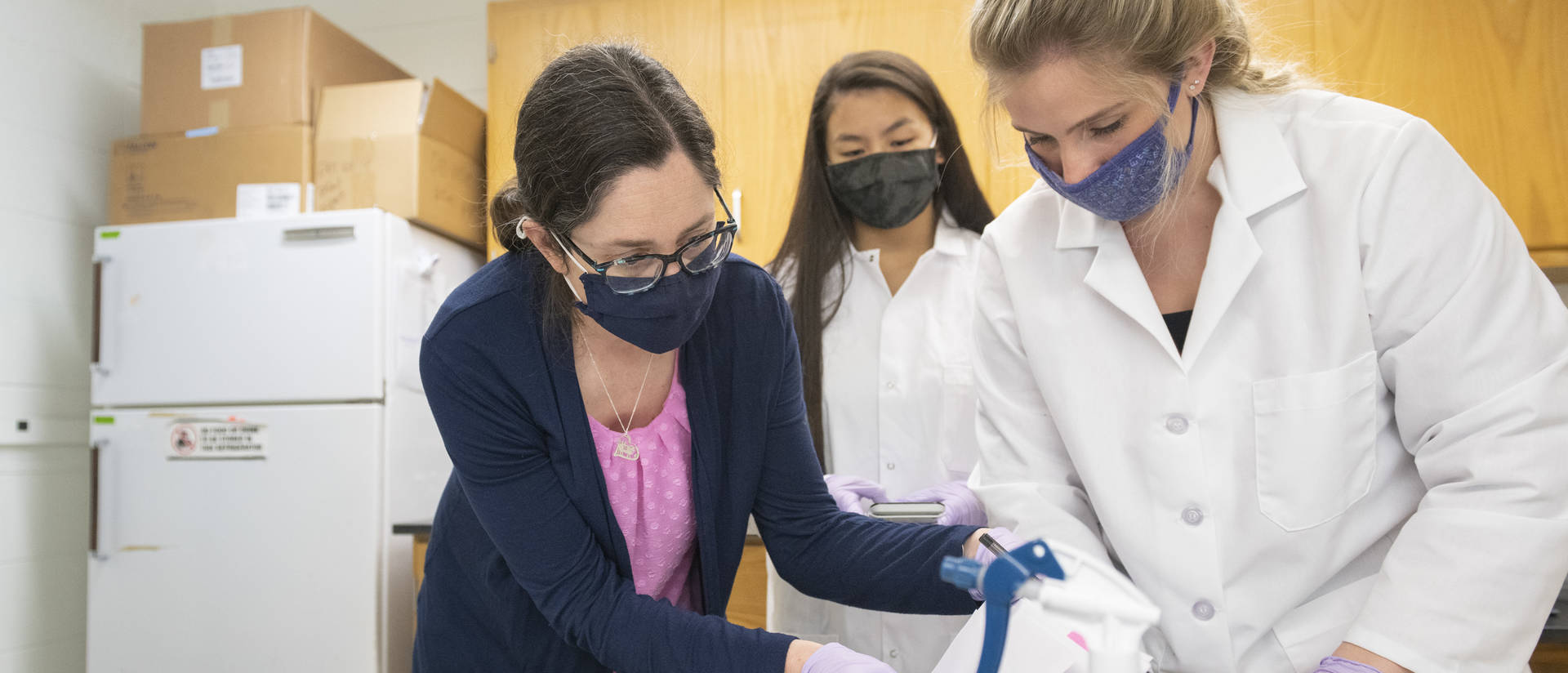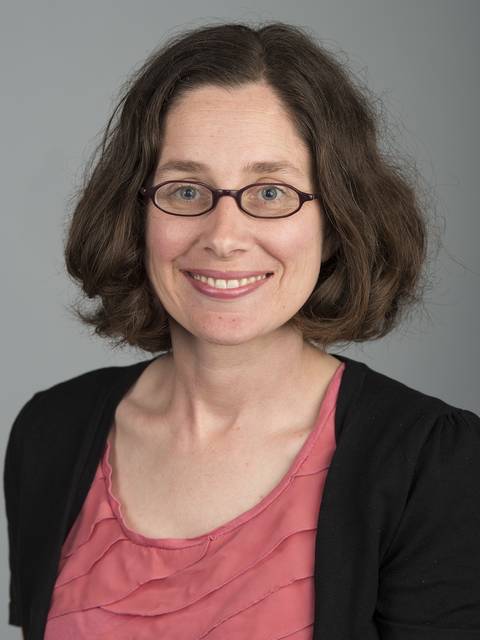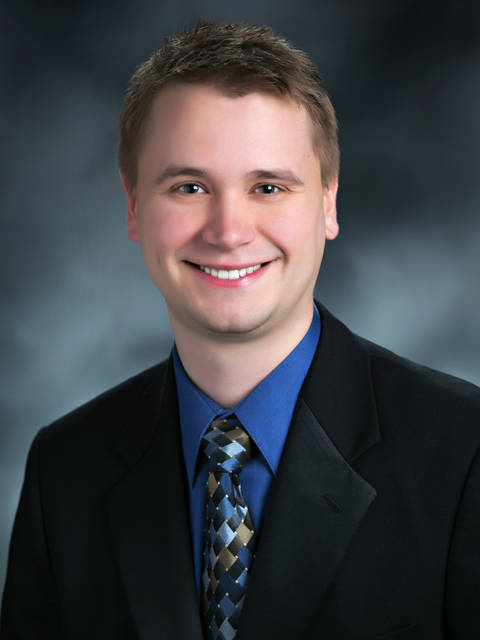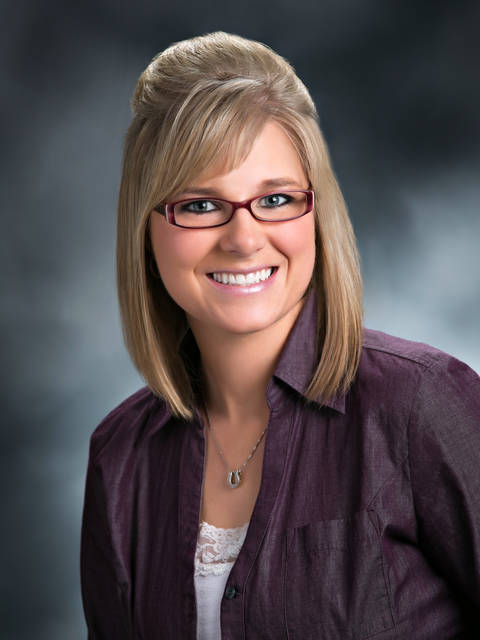
Genetics research connects students with alumni
Blugolds work together to prepare future scientists, medical leaders
By Gary Johnson
Photo caption: Dr. Jamie Lyman Gingerich, a UW-Eau Claire associate professor of biology, works in a Phillips Hall laboratory with students Kati Sadowska, center, and Caterra Leavens.
Student researchers are getting a glimpse of their potential futures as scientists and medical leaders through a collaborative research project that connects them with alumni working in the field of human genetics.

Jamie Lyman Gingerich
Dr. Jamie Lyman Gingerich, associate professor of biology
The research, led by Dr. Jamie Lyman Gingerich, a UW-Eau Claire associate professor of biology, examines genetic disorders of unknown cause and whether specific changes in patients’ DNA may have a role in their symptoms. The findings could help lead to a formal medical diagnosis, thus benefitting the patients.
Lyman Gingerich and other UW-Eau Claire faculty and students are working on the project with Blugold alumni at the Marshfield-based genetic testing company PreventionGenetics and Mayo Clinic Health System.
“It is really exciting to be working with alumni from UWEC,” Lyman Gingerich says. “My undergraduate students have commented that they appreciate seeing where alumni go and what they do with their degrees.”
“It is really exciting to be working with alumni from UWEC,” Lyman Gingerich says. “My undergraduate students have commented that they appreciate seeing where alumni go and what they do with their degrees.”
Blugold alumnus Dr. Greg Fischer, a 2011 graduate who is a human molecular geneticist at PreventionGenetics, says working with UW-Eau Claire faculty and student researchers is one of the most rewarding parts of his career.
Fischer recalls his undergraduate research experiences at UW-Eau Claire being the “No. 1 driving force” behind his decision to pursue a Ph.D. in genetics.
“Our corporate-academic partnership is one of the ways I can give back to UW-Eau Claire as an alum,” Fischer says. “Many of our previous interns go on to pursue graduate studies or become full-time employees at PreventionGenetics. It’s pretty great to know I helped them gain the skills necessary to achieve their career goals.”
Lyman Gingerich’s research project grew out of a faculty-alumni connection between Fischer and his undergraduate research mentor, Dr. Julie Anderson, associate professor of biology and director of UW-Eau Claire’s Health Careers Center.
In 2018, Anderson, Fischer and others at PreventionGenetics developed a workshop for a UW-Eau Claire molecular genetics course so students could interact with alumni at the company. Anderson says the interactions from the workshop led to several students landing jobs at PreventionGenetics.
During a lunch meeting, Anderson and Fischer discussed a potential collaborative research project that Anderson later shared with colleagues in the biology department. Lyman Gingerich obtained funding from Mayo Clinic Health System for the collaboration that could impact patients and involve UW-Eau Claire undergraduate students in cutting-edge research.
Lyman Gingerich was attracted to the research project because she saw potential to engage students and learn from colleagues and collaborators.
“I love puzzles, and science involves so many puzzles and questions,” Lyman Gingerich says. “Figuring out how nature works is both inherently fascinating and an unending challenge.”
Multiple members of UW-Eau Claire’s biology department — Lyman Gingerich, Anderson, associate professor Dr. Derek Gingerich and assistant professors Dr. Crystal Del Valle and Dr. Bradley Carter — are members of the faculty research team and contribute different expertise to the project along with their shared background in science.
For example, Del Valle trained Lyman Gingerich and the first student researcher in tissue culture techniques, while Carter will coordinate assessment efforts when the project moves into the classroom. Gingerich mentors students in analyzing the DNA sequences.

Dr. Greg Fischer, associate human molecular geneticist at PreventionGenetics, specializing in autism disorders
At PreventionGenetics, Fischer uses his undergraduate and graduate research background in genetics and molecular biology to help students identify variants where further experiments could lead to or rule out a diagnosis. Determining whether a genetic variant is disease-causing could mean a patient may be able enroll in a clinical trial or receive a particular treatment, Fischer says.
For example, Fischer says, the research could help diagnose conditions such as retinitis pigmentosa or Leber congenital amaurosis, which cause extreme visual impairment over time. If the research can identify disease-causing genetic changes, a patient may be eligible for gene therapy that could restore some vision.
Dr. Angela Gruber, another UW-Eau Claire alumna who works at PreventionGenetics as a human molecular geneticist, was involved in the project, recruiting talented undergraduates for the company’s summer internships and mentoring them during the project.
Gruber, who graduated with a bachelor’s degree in biochemistry and molecular biology, says she provides the environment for students to make mistakes and encounter obstacles, then guides them to think through the issues.
Working with her former professors and mentors has been special for Gruber.

Dr. Angela Gruber, associate human molecular geneticist at PreventionGenetics, specializing in muscle and kidney disorders
“I think it is rewarding for them to see previous students succeed, but also rewarding for me to prove that I have developed into a contributing member of the scientific community,” Gruber says.
“I think it is rewarding for them to see previous students succeed, but also rewarding for me to prove that I have developed into a contributing member of the scientific community,” Gruber says. “The academic-industry partnership allows for students to see that what they are learning in their classes is actually useful for real life and real patients. It allows them to apply classroom concepts and, therefore, better retain the information they are learning. Students also see UWEC alumni leading successful scientific careers and hopefully value the education and experiences that UWEC provides.”
Another Blugold, Christina Zaleski, is director of genetic counseling at PreventionGenetics. She is a 1996 biology graduate.
Student researchers
Daniel Reither, a 2020 UW-Eau Claire graduate in biochemistry/molecular biology, was looking for undergraduate laboratory research experience when he became the first student researcher on the project. Reither worked with faculty to set up new equipment and learn new techniques.
“It's one thing to learn about biological processes from a book or a lecture,” Reither says. “It's another thing to see their application in the ‘wet lab.’ At the time, I was unsure of what path to pursue after graduation, and I hoped that the experience of working in Dr. Lyman Gingerich’s lab would help point me in the right direction. The experience exceeded my expectations.”
The research prepared Reither for the future and had a direct application for his present job as a lab technician at a company that focuses on manufacturing regenerative treatments for clinical trials for patients with congenital heart disease.
“Being able to be a part of this research project was a true privilege that was only made possible via the collaboration of UWEC alumni,” Reither says. “It was encouraging to see the strong community that UWEC helped build between organizations that made the project possible. It made me realize that if I ever need help as I move onward, I will have a community I can rely on.”
UW-Eau Claire freshman Kati Sadowska of Marshfield wanted to be part of the faculty-student research project to help her develop critical laboratory skills while helping medical patients.
Sadowska, who is part of the Blugold Biomedical Innovator Program, is considering changing her major from chemistry to biochemistry/molecular biology because of her experience with the project. She’s now looking at a career in the genetics field.
“I am so glad to be involved, not only for the undergraduate research, but to be able to better the lives of patients as well,” Sadowska says. “I never expected to be able to have such an impact on others so early in my college career.”
“I am so glad to be involved, not only for the undergraduate research, but to be able to better the lives of patients as well,” Sadowska says. “I never expected to be able to have such an impact on others so early in my college career.”
Classroom applications
UW-Eau Claire biology professors are working to integrate their research into the department’s genetic inquiry lab course, Lyman Gingerich says, so students can be involved in research while they learn the concepts.
“In the biology department — as within the sciences and the university as a whole — we work to help students develop the skills and knowledge to critically engage in their field,” Lyman Gingerich says. “We hope that by doing this research, the students will identify as scientists, refine their skills and maybe discover a new passion.”
Katie Plamann, who graduated from UW-Eau Claire in 2015 with majors in biology and psychology, is a genetic counselor in Mayo Clinic Health System’s department of clinical genomics. She will provide curriculum development input for the research project.
As an undergraduate researcher, Plamann worked with Lyman Gingerich and now can share her expertise about what is needed in the medical field from the perspective of genetic counseling.
“To move health care and scientific knowledge forward, we need to combine strengths and expertise across disciplines,” Lyman Gingerich says.
Research was an important part of Plamann’s undergraduate training in biology and psychology, she says, adding that research projects like Lyman Gingerich’s are important in a rapidly advancing field like genetics.
“Studies like this one continue to advance our ability to accurately interpret genetic variants, and ultimately genetic testing results, for patients and families,” Plamann says. “Work like this is also important in preparing future health care providers for work in genetics by providing them experience during their undergraduate training.”
Support undergraduate research opportunities at UW-Eau Claire